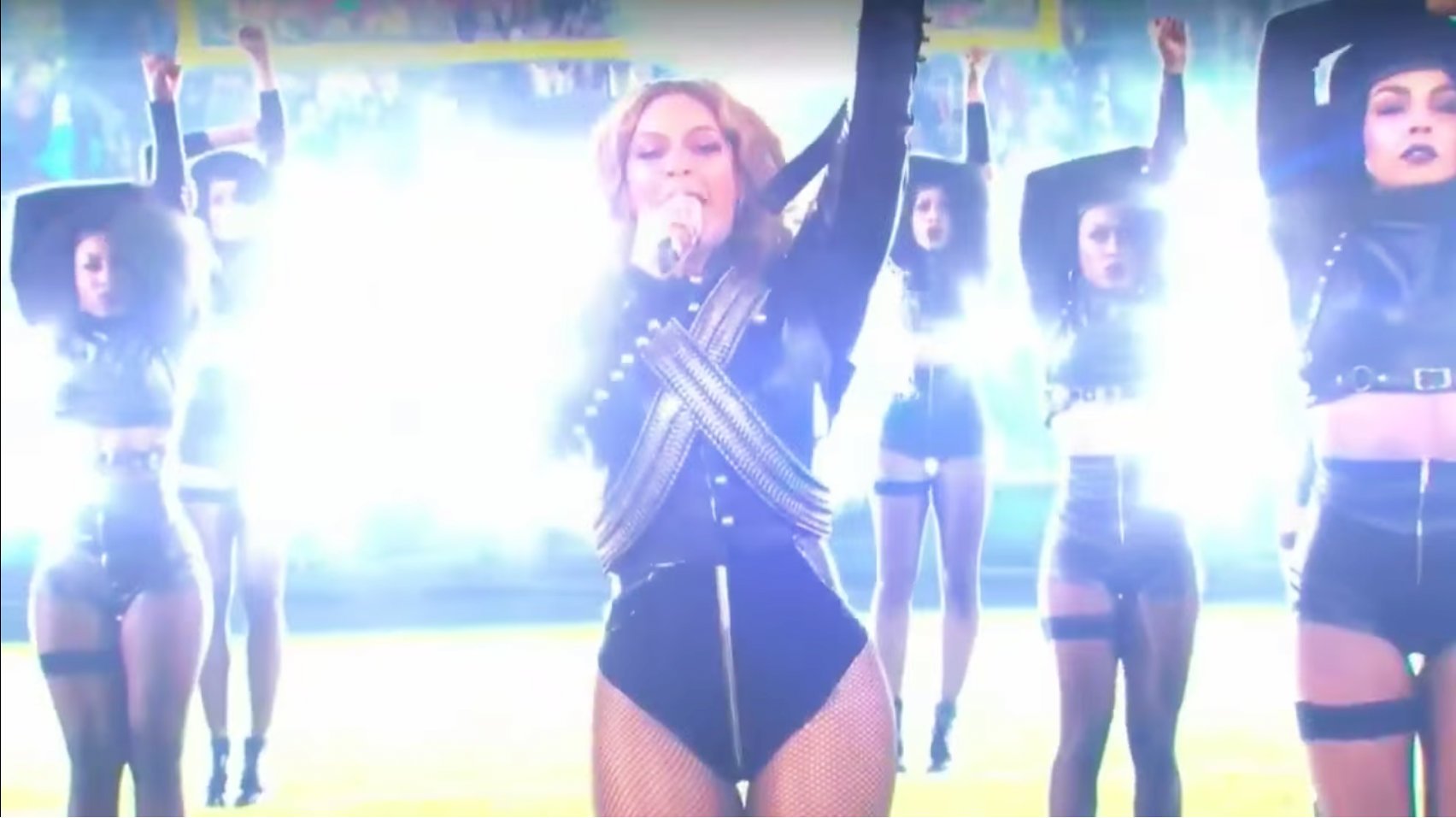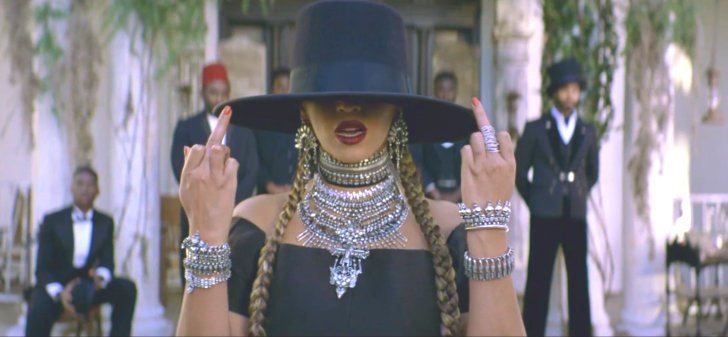Why Formation is the Anti-Respectability Anthem We've Been Waiting For
by Kimberly Foster @KimberlyNFoster
Beyoncé is one of the biggest names is music, and she is using her visibility to raise the profile of the Black Lives Matter Movement. The recently debuted video for her new single, Formation, contained clear messages about the ongoing struggle against police brutality and white supremacy in the United States. She carried that message onto the field of Super Bowl 50 when she, backed by dancers dressed in leather, berets, and combat boots, a look commonly associated with the Black Panthers, performed the song live for the first time.
Beyoncé’s celebration of militant blackness on one of the world’s largest stages signals a shift in both her consciousness and her artistry. She sang, “I like my baby hair with baby hair and afros/I like my negro nose with Jackson 5 nostrils” as a squad of afro-ed black women of every shade moved behind her with military precision. 50 years after the founding of the Black Panther Party for Self Defense, the women performed choreography that included a black power salute. It was a subtle, urgent act of defiance wherein Black female bodies demanded to be seen.
In the past, Beyoncé and her husband, Jay Z, have been criticized for their silence on issues affecting Black America. The Carters now publicly engage with social justice work. Tidal, Jay-Z’s music streaming service, announced that it will donate $1.5M to Black Lives Matter organizations on Feb. 5, what would have been Trayvon Martin’s 21st birthday. This comes two years after the two appeared at a New York City rally for Martin following George Zimmerman’s acquittal. And the rumors floated in 2015 about the couple donating money to bail out protestors in Ferguson and Baltimore indicates that they are watching even when they are not speaking publicly.
The politicization of “Formation’s” visuals reflects the current cultural moment. These images of black struggle and black pride allow her to contribute to the discourse in her sphere of influence. In doing so, she carries the torch of Black artists who have used their platforms for protest. Beyoncé’s performance outfit differed from the dozens of women who stood behind her. Her cropped leather jacket with gold-plated vest recalled the costume Michael Jackson, another Black artist who spoke out against racism and global injustice, wore to perform the same event in 1993.
A politicized Beyoncé is a far cry from the tempered, unobjectionable star who emerged in the aughts with 2003’s “Crazy in Love.” As a solo artist, she offered safe, enjoyable, but somewhat predictable pop songs and videos meant to appeal to cross-over audiences. Though she’s always been a songwriter, her creative output felt impersonal. She built her career carefully, and remained guarded so as not to provide ammunition for its derailment.
“Formation” puts in front of us a fully liberated Beyoncé. The woman who has largely managed to avoid the landmines of black pop culture stardom, steps deliberately into the controversial by visually referencing an often-demonized organization for radical activism for hundreds of millions of viewers. She now leverages the influence gained by the meticulous management of her public image to deploy her most pointed cultural critique.
Beyoncé’s work, up to this point, has not been wholly apolitical. With 2013’s self-titled album, she asserted, repeatedly, a feminist identity and withstood the backlash and criticism that comes with aligning oneself with the movement. But those politics were still rooted in a feel-good empowerment model of liberation. She assumes a different kind of risk in daring to criticize structural racism and state violence.
Nina Simone once said, “It is an artist’s duty to reflect the times.” Beyoncé heeds the call. With her enormous reach, she, too, possesses the power to move culture, and she has taken to filling the void of anti-racist voice in contemporary pop music. To reflect the times, she opts out of inoffensive fluff and wades into exhortations of black brilliance and black power.
With Formation and the images that have accompanied it, Beyoncé rejects, plainly, the mandates of respectability. She does not shy away from the messiness of political transformation and takes up the fight from the place she knows and loves best. This mode of artistic activism in a post-Ferguson society adds a new dimension to her work on the massive stage she has spent most of her life fighting to occupy. With it she reveals that despite her incredible success, she is very much a citizen of the world.
Kimberly Foster is the founder and editor-in-chief of For Harriet. Email or Follow @KimberlyNFoster
Beyoncé is one of the biggest names is music, and she is using her visibility to raise the profile of the Black Lives Matter Movement. The recently debuted video for her new single, Formation, contained clear messages about the ongoing struggle against police brutality and white supremacy in the United States. She carried that message onto the field of Super Bowl 50 when she, backed by dancers dressed in leather, berets, and combat boots, a look commonly associated with the Black Panthers, performed the song live for the first time.
Beyoncé’s celebration of militant blackness on one of the world’s largest stages signals a shift in both her consciousness and her artistry. She sang, “I like my baby hair with baby hair and afros/I like my negro nose with Jackson 5 nostrils” as a squad of afro-ed black women of every shade moved behind her with military precision. 50 years after the founding of the Black Panther Party for Self Defense, the women performed choreography that included a black power salute. It was a subtle, urgent act of defiance wherein Black female bodies demanded to be seen.
In the past, Beyoncé and her husband, Jay Z, have been criticized for their silence on issues affecting Black America. The Carters now publicly engage with social justice work. Tidal, Jay-Z’s music streaming service, announced that it will donate $1.5M to Black Lives Matter organizations on Feb. 5, what would have been Trayvon Martin’s 21st birthday. This comes two years after the two appeared at a New York City rally for Martin following George Zimmerman’s acquittal. And the rumors floated in 2015 about the couple donating money to bail out protestors in Ferguson and Baltimore indicates that they are watching even when they are not speaking publicly.
The politicization of “Formation’s” visuals reflects the current cultural moment. These images of black struggle and black pride allow her to contribute to the discourse in her sphere of influence. In doing so, she carries the torch of Black artists who have used their platforms for protest. Beyoncé’s performance outfit differed from the dozens of women who stood behind her. Her cropped leather jacket with gold-plated vest recalled the costume Michael Jackson, another Black artist who spoke out against racism and global injustice, wore to perform the same event in 1993.
 |
| Photo: CBS |
“Formation” puts in front of us a fully liberated Beyoncé. The woman who has largely managed to avoid the landmines of black pop culture stardom, steps deliberately into the controversial by visually referencing an often-demonized organization for radical activism for hundreds of millions of viewers. She now leverages the influence gained by the meticulous management of her public image to deploy her most pointed cultural critique.
Beyoncé’s work, up to this point, has not been wholly apolitical. With 2013’s self-titled album, she asserted, repeatedly, a feminist identity and withstood the backlash and criticism that comes with aligning oneself with the movement. But those politics were still rooted in a feel-good empowerment model of liberation. She assumes a different kind of risk in daring to criticize structural racism and state violence.
And Beyoncé is not untouchable. She has much to lose. Since her showing at the Super Bowl, conservatives have come out against her performance. On Fox News the next day, former New York mayor Rudy Giuliani called the roughly 90 televised seconds of Formation an “attack” on police. Should she continue these statements, the animus of her detractors will only intensify.
Nina Simone once said, “It is an artist’s duty to reflect the times.” Beyoncé heeds the call. With her enormous reach, she, too, possesses the power to move culture, and she has taken to filling the void of anti-racist voice in contemporary pop music. To reflect the times, she opts out of inoffensive fluff and wades into exhortations of black brilliance and black power.
With Formation and the images that have accompanied it, Beyoncé rejects, plainly, the mandates of respectability. She does not shy away from the messiness of political transformation and takes up the fight from the place she knows and loves best. This mode of artistic activism in a post-Ferguson society adds a new dimension to her work on the massive stage she has spent most of her life fighting to occupy. With it she reveals that despite her incredible success, she is very much a citizen of the world.
Kimberly Foster is the founder and editor-in-chief of For Harriet. Email or Follow @KimberlyNFoster

No comments: